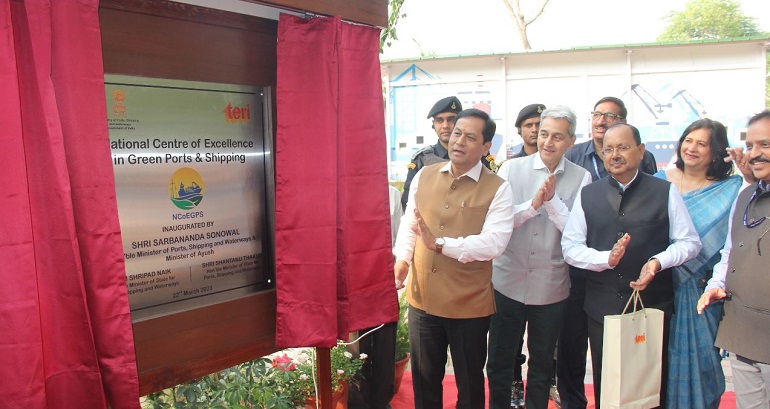India has inaugurated its first National Centre of Excellence in Green Port and Shipping (NCoEGPS), a collaboration between the Ministry of Ports, Shipping and Waterways (MoPSW) and The Energy and Resources Institute (TERI). The center is located in Gwal Pahari, Gurugram, and is expected to play a critical role in steering the shipping industry towards carbon neutrality and a circular economy. The NCoEGPS will focus on developing a regulatory framework and alternative technology adoption roadmap for green shipping in India.
The Minister for Ports, Shipping and Waterways, Mr. Sarbananda Sonowal, who inaugurated the center, stated that the NCoEGPS reflects India’s commitment towards a greener environment. He emphasized that the center’s specific objective is to empower the “Make in India” initiative in ports, coastal and inland water transport, and enable fast-track innovation to provide technologically advanced and sustainable solutions to the sector.
The center will work to provide decision-makers at the national and sub-national level with the methodology and framework to implement carbon neutrality measures in the shipping sector. The NCoEGPS will be the single-point contact for the Ministry in matters relating to green port, green shipping, and green vessels and will be pivotal in evolving solutions in terms of policy, research, and technology that will enable the greening of the sector.
The NCoEGPS will collaborate closely with the four ports and technical expertise from countries such as Norway and Denmark to provide solutions to the problems faced by the sector through scientific research. The center will act as a technological arm of MoPSW and engage with the policy and research aspects related to green shipping and work on areas of energy and emission management and sustainable maritime operations.
The center will work on ten crucial projects in the beginning, including developing a regulatory framework for the usage of wind energy for marine applications and identifying a suitable biofuel for blending with conventional marine fuels. It will also work towards identifying a fuel-cell technology for long haul shipping, preparing detailed project reports on low energy consumption ports, offshore platforms for tapping solar energy, and the production, storage, and usage of green hydrogen.
The NCoEGPS is a significant step towards India’s sustainable development commitments, and its work will be based on funding support for infrastructure development and supporting research and capacity-building by the MoPSW and entities under it for a period of five years.


